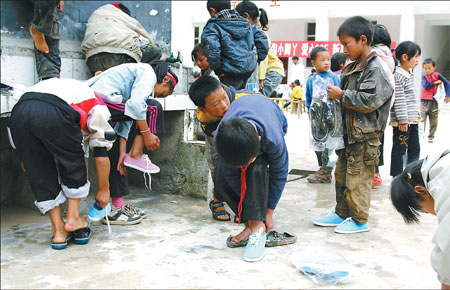Providing charity not free
Updated: 2011-11-18 11:52
By Shi Yingying (China Daily European Weekly)
|
|||||||||
|
 Above: Children in Sichuan province try on some of the 5,000 pairs of shoes provided by Dishui Public Welfare Association. Below: Xu Zhengjun's message is, "I want more attention for charity people from society." Xu runs an NGO in Kunming that helps other NGOs with training. He took the grassroots job (and a 40 percent pay cut) at the start of this year, after having worked at a Hong Kong foundation. [Photos Provided to China Daily] |
NGO workers unrewarded by meager wages post notices online in hope of gaining public support
The work done by professionals for nonprofit groups, such as a non-governmental organization (NGO), is often undervalued. And donors don't understand that providing charity does cost money. It isn't free. So Xu Zhenjun opts to sleep late one Monday and idle away the rainy day.
"I am on strike with my two colleagues," Xu, who runs an NGO in Kunming, Yunnan province, says. Xu, and other NGO professionals, decide not to work on Nov 7. "We didn't go out onto the street with signs, shouting slogans. We simply chose to not show up at work on the first Monday of November," Xu says.
They also posted notices online about their intentions. Xu's aim was to deliver a clear and specific message in the hope of gaining public support. Salaries for nonprofit professionals need to be increased 10 to 20 percent by the end of this year, he says.
"We (nonprofit professionals) were in short supply 10 years ago and will be 10 years from now because of the poor pay," he says. "A colleague of mine, earning just over 1,000 yuan a month, told me he couldn't afford pork because it was 40 yuan a kilogram in the market. That's pathetic."
A survey conducted in October 2010 by the Narada, Tencent and Liu Hongru Financial Education Foundations found that almost 90 percent of NGO employees earn less than 5,000 yuan (583 euros) a month.
More than 18 percent of the 5,000 NGOs that participated says their salaries were under 1,000 yuan or they didn't have fixed income. Most who were paid more than 5,000 yuan worked for foundations.
"The younger generation can usually survive for the first couple of years after their graduation," Xu says, "but soon after, they get to marriageable age and figure they've got families to support, and they quit."
Xu is 37 and says he is "all right" financially but is concerned about others who also love the kind of work they do.
Entry-level salaries at NGOs aren't much different from those at for-profit companies, he says, but businesses give pay raises "almost every year, and NGOs barely do that".
"A few years pass and when you finally get up the nerve to ask for a better salary, you realize that your boss, who has been working in the field for more than 10 years, is earning 3,000 yuan a month - just a little bit more than you."
The survey also showed that only 28 percent of NGO executives have salaries over 5,000 yuan.











